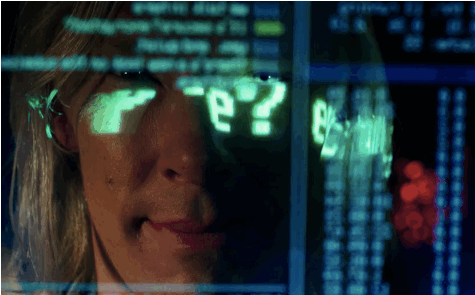There are many, many, reasons why The Fifth Estate, which opens today nationwide, will be savaged by the Internet, critics, moviegoers—but mostly the Internet. A listless plot some will say, packing their thinkpiece muskets. A desperate, David Fincher-adjacent script that squanders its cast. Whatever this is. But I suspect what will make eyes carom around their sockets is director Bill Condon’s audacity to commit the gravest of sins: getting the Internet wrong. I might be right.
The Fifth Estate depicts WikiLeaks not as a series of nondescript files sitting in a server somewhere, but as a physical place in some Cyber Realm. An impossible sea of desks stretching out to infinity in every direction at once—that is the metaphor Condon uses to explain a website in 2013, and one that Benedict Cumberbatch’s Julian Assange and his of band of merry white-hats routinely inhabit because Internet.
In an early scene a legion of Cyber Assanges are shown at each of those Cyber Desks, hacking, presumably, the planet. It’s dire. But I get Condon’s dilemma, even if it’s unclear whether he understands ours; progress bars and encryption are not particularly exciting, but they’re real. Thrilling cinema and honest depictions of technology are eternally insoluble: how do you make file transfers and peer hosting, the banal and immaterial and for many the utterly alien, riveting?
As Nathan Shedroff and Christopher Noessel note in Make It So: Interactive Design Lessons from Science Fiction, you falsify operating systems that bleat with every button press; stage full screen notifications that scream DELETED and SYSTEM OF A DOWN; inexplicably streak cyan text across your actors because this is WikiLeaks dot org and things are about to get fucking Cyber.

What Condon’s metaphor does is illuminate how our sense of ownership of technology is fluid; subject to who is looking at it at any moment. To an engineer, a piece of code could represent countless months of work and compromise, a crowning achievement. When it faces the average user, the same code could be the promise of an iPad, if only that damn monkey could hold still.
Who and where technology faces is critical to understanding how we give ourselves to the web and what it demands in return. In The Fifth Estate, WikiLeaks is as much an advertisement of Assange’s genius as it is a devourer of secrets.
So to dismiss Condon’s metaphor as backward, contemptuous, or worse, unnecessary, ignores the audacity of presenting the web of Amazon and Weird Tricks as a space to hook our hopes and dreams and legacies, and whether or not those utopic visions are ours in the first place. Asking what such a metaphor can do for our understanding of the web and its surrounding technologies is far more interesting than debating whether Condon and his VFX team understood content management systems; there may well be a time when an impossible horizon of desks greets us every morning.
“Metaphors are important because they help us grapple with difficult ideas,” Daniel Joseph, a PhD Researcher at Ryerson and York University's Communication and Culture program, wrote over Gchat, “they allow us to access that which is impenetrable.” A Cyber Realm where an army of hackers can obfuscate and scheme and unearth the terrible is an imperfect metaphor. Perhaps WikiLeaks is more of a graveyard, a mausoleum—those scenes had a terrible stillness to them, and if you’re a merchant of political secrets your currency, its inherent value, is the death toll contained within. I didn’t need an abstracted world to understand those stakes, but I’m not Assange, and WikiLeaks is not my orchard.





